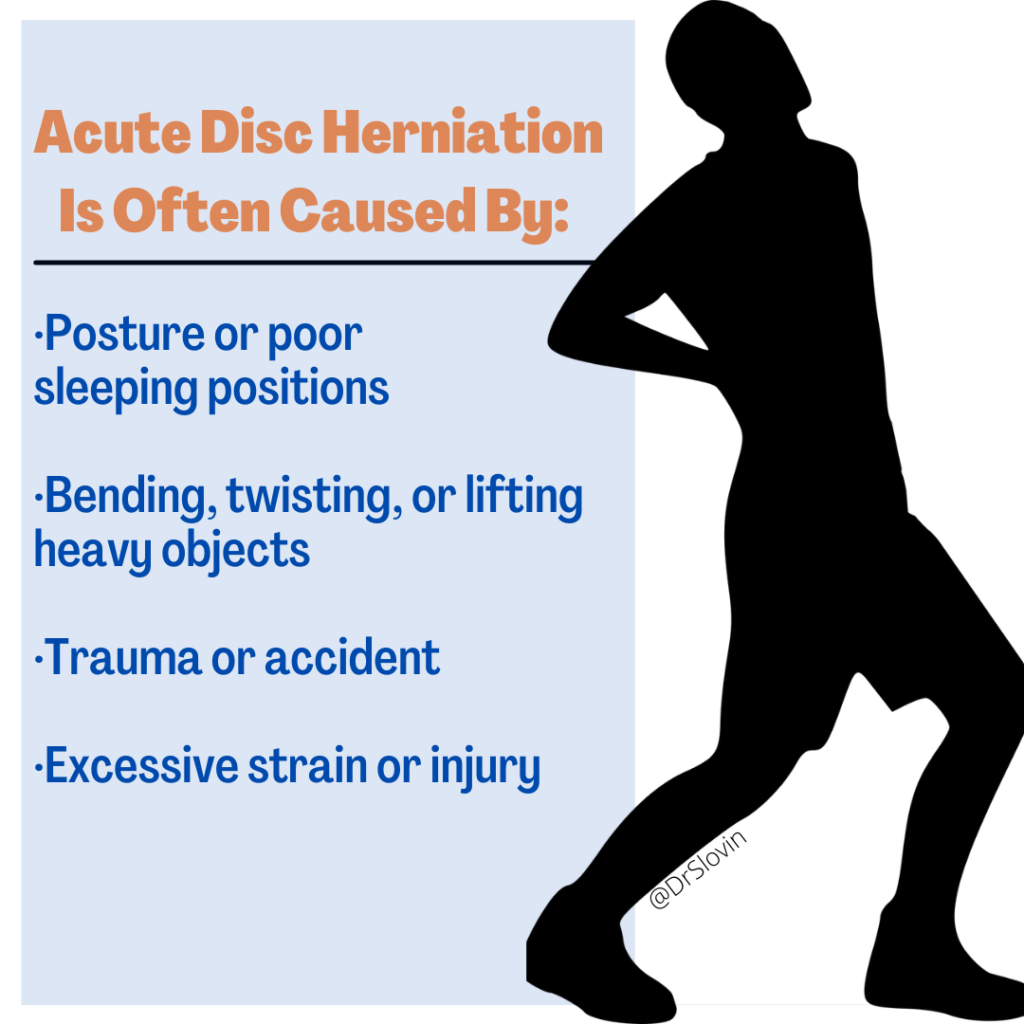Acute Disc Herniation: What’s Next?

Acute Disc Herniation: What’s Next?
One of the most common causes of low back pain is acute disc herniation in the lumbar spine. The condition has several emergent and non-emergent causes. Therefore, it’s important to understand the various origins and symptoms of acute disc protrusion, so you know what to do and who to contact when the intense pain begins.
Causes and Symptoms of Acute Disc Herniation
Approximately 2% of the 80% of people with low back pain suffer from acute disc protrusion every year. And those are only the reported cases. In previous posts, I talked about some of the causes of a slipped or herniated disc; however, there’s a difference between chronic and acute disc herniation in their causes and symptoms. Chronic disc herniation is when the pain recurs over a long period. Chronic disc herniation is often due to things like:
· Genetics or family history of herniated discs
· Past history of acute disc herniation
· Medical conditions like degenerative disc disease or osteoporosis that destabilize the spine bones (vertebrae)
Acute disc herniation is often caused by:
· Posture or poor sleeping positions
· Bending, twisting, or lifting heavy objects
· Trauma or accident
· Excessive strain or injury
In acute sciatica from disc protrusion, the pain is usually more pronounced in the leg than in the lower back. In chronic cases, it’s often worse in the back than in the legs. Pain can be sharp, stabbing, or radiating in nature.
What to Do When You Suddenly Herniate a Disc

The first thought is usually,
“Oh no! Did I break something? Should I go to the emergency room? Will I need surgery and a strong medication?”
There’s no reason to panic yet. Most of the time, the condition is not a medical emergency and gets better on its own with rest, ice, and light stretching or exercises. Acute disc herniation only requires immediate medical attention if the following occurs:
· The cause is cauda equina syndrome
· You experience significant leg weakness or pain
· You have a loss of bowel or bladder function
· There’s numbness in the genital region
· You have a history of metastatic cancer
· There’s a fever with the lower back pain
· You’ve had a severe fall, accident, or another injury that caused the disc protrusion
If none of the above are present, the first thing you want to do is take it easy, rest in a comfortable position, and ice the area for 20 minutes at a time for a couple of days. Once you feel ready, you can start doing minor stretches or light walking to help you regain mobility. It can take several weeks to get back to normal mobility. That’s when you want to see your chiropractor.
Why Chiropractic Care for Acute Disc Herniation?
A skilled chiropractor like Dr. Slovin can help you get back to normal after acute disc herniation. The hands-on therapeutic process is safe and effective in achieving herniated disc pain relief without opioids or surgery.
At Slovin Chiropractic Center, we tailor innovative chiropractic techniques to your needs, and we pair those techniques with a whole-body approach to care. It’s why we’re able to keep our outstanding ratings from patients who’ve been through our Norwalk chiropractic clinic. If you’re currently experiencing sciatica pain from acute disc herniation, request an appointment with your chiropractor today. Let’s get you back to life.
Sources:
Cleveland Clinic: Herniated Disk
